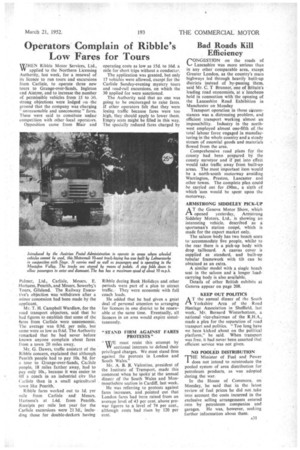Operators Complain of Ribble's Low Fares for Tours
Page 33

If you've noticed an error in this article please click here to report it so we can fix it.
ViTHEN Ribble Motor Services, Ltd., applied to the Northern Licensing Authority, last week, for a renewal of its licence to run tours and excursions from Carlisle, to operate three new tours to Grange-over-Sands, Ingleton and Aintree, and to increase the number of permissible vehicles from 15 to30. strong objections were lodged on the ground that the company was charging " unreasonable and uneconomic" fares. These were said to constitute .unfair competition with other-local operators.
Opposition came from Blair and Palmer, Ltd., Carlisle, Messrs. E. Hartuess, Penrith, and Messrs. Sowerby's Tours, Gilsland. The Railway Executive's objection was withdrawn after a minor concession had been .made by the applicant.
Mr. T. H. Campbell Wardlaw, for the road transport objectors, said that he had figures to establish that some of the fares from Carlisle were uneconomic. The average was 0.9d. per mile, but some were as low as 0.6d. The Authority remarked that he had never before known anyone complain about fares from a town 20 miles away. Mr. G. Dawes, traffic assistant of the Ribble concern, explained that although Penrith people had to pay 10s. 9d. for a tour to Grange-over-Sands, Cailisle people, 18 miles farther away, had to pay only 10s., because it was easier to till a coach in an industrial city like Calisle than in a small agricultural town like Penrith. Ribble fares worked out to Id. per mile from Carlisle and Messrs. Hartness's at 1.4d. from Penrith. Receipts per mile last year for the Carlisle excursions were 21 3d., including those for double-deckers having operating costs as low as 15d. to 16d. a mile for short trips without a conductot-. The application was granted, but only 17 vehicles were allowed, except for the Carlisle Sunday-evening mystery tours and road-rail excursions, on which the 30 applied for were sanctioned. The Authority said that no one was going to be encouraged to raise fares. If other operators felt that they were losing traffic because fares were too high, they should apply to lower them. Empty seats might' be fined in this way. The specially reduced fares charged by Ribble during Bank Holidays and other periods were part of a plan to attract traffic.They were economic with full coach loads. He added that he had given a great deal of personal attention to arranging for licences in one district to be renewable at the same time. Eventually, all licences in an area would expire simultaneously.
"STAND FIRM AGAINST FARES PROTESTS"
" WE must resist this attempt by sectional interests to defend their privileged charges. We must stand firm against the protests in London and South Wales." Mr. A. B. B. Valentine, president of the Institute of Transport, made this comment when he spoke at the annual dinner of the South Wales and Monmouthshire section in Cardiff, last week. He was referring to protests against fares increases, and_ pointed out that London fares had been raised from an average level of 43 per cent. above prewar figures to a level of 74 per cent., although costs had risen by 120 per cent.




















































































